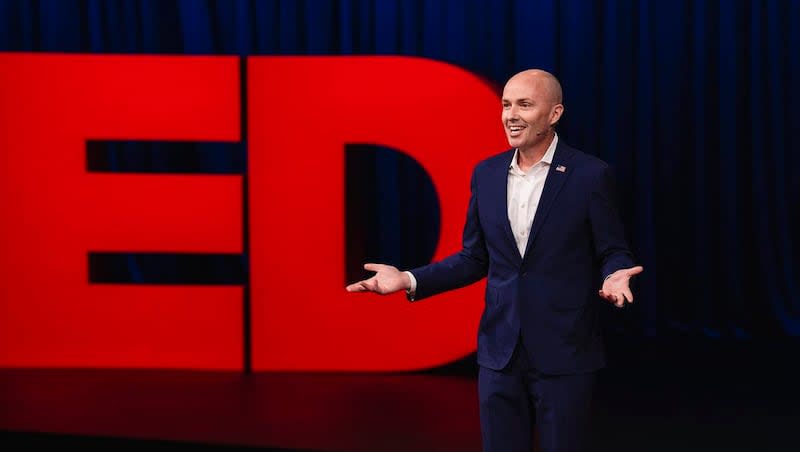Utah Gov. Spencer Cox takes ‘Disagree Better’ to the TED Talks stage

- Oops!Something went wrong.Please try again later.
Then-Utah Lt. Gov. Spencer Cox stood in stunned silence.
Several dozen “screaming” protesters, packed into a small Capitol room, insisted “the election had been stolen” and urged Cox to refuse the routine task of certifying the state’s Electoral College votes.
“I know what you’re thinking, and you’re probably wrong,” Utah’s governor said on Wednesday, interrupting his narrative. “This was not 2020. This was 2016.”
It was also the year he begrudgingly began to believe Ronald Reagan’s famous maxim: American freedom is “never more than one generation away from extinction,” Cox told the thousands of thought leaders gathered to hear him speak. This fear became all the more real four years later as riots rampaged across the country and public figures seeded doubt in an election that was still months away.
The country in chaos made Cox look inward, he said, at how political leaders like himself could better “uphold the values that we teach our kids.”
This was the message Cox shared Wednesday as he brought his national “Disagree Better” campaign to his broadest audience yet as the only sitting elected official to speak at the biannual flagship TED Talks conference.
Cox took the stage during the “bridge-builders” session, midway through the four-day event held in Vancouver, Canada, which featured nearly 80 speakers, including Free Press founder Bari Weiss, activist investor Bill Ackman, Forward Party founder Andrew Yang, and dozens of artists, academics and business influencers.
His 12-minute, memorized remarks challenged the depth of America’s political division, arguing that political polarization is less a problem of differences between Republicans and Democrats, and more the product of “conflict entrepreneurs in both the media and politics” who profit from exaggerating the extremism of the other side.
But, Cox said, “the best news of all is that there are very practical things that every one of us can do every day to help heal the divides in our nations and our neighborhoods.”
What can individuals do to decrease political polarization?
Cox learned this lesson firsthand during his first gubernatorial campaign in 2020, he told the auditorium of nearly 2,000 attendees. That year Cox made headlines for a viral video he made with the Democratic nominee, Chris Peterson, which he showed to the audience.
In the clip, the two candidates express their shared commitment to democratic values and mutual respect. The end of the video was met by applause and cheers from the TED crowd.
“I could actually feel my faith in the American idea start to rekindle,” Cox said of the ad’s popularity. “It seemed like there was a hunger for architects instead of arsonists.”
This hope was reinforced when the video was later used in a Stanford study of 30,000 Americans, according to Cox. The results showed that the ad had “a measurable depolarization effect, including a reduction in urges towards violence” among its viewers, he said.
“It turns out, there really are things that we can do to alter the trajectory of the United States,” Cox said.
Since taking up the mantle of chairman of the National Governors Association in 2023, Cox has spearheaded an effort to teach America’s leaders, and their constituents, a healthier form of dialogue. Over the last six months, 20 bipartisan pairings of governors and elected officials have filmed ads, like Cox and Peterson’s, sharing how they can work together despite their different worldviews.
In February, Cox showcased the initiative in Washington, D.C., where he headlined a forum with Democratic Maryland Gov. Wes Moore and met with President Joe Biden, who praised the “Disagree Better” initiative.
While it has earned him criticism from the political left and right, Cox said a good faith effort to engage with Americans across the aisle is “the only way for us to remember how to disagree without hate and contempt.”
In his talk, Cox encouraged Americans to take four steps:
Spend less time with polarizing headlines that pit one side of the country against the other.
Spend more time with people who think differently than you because it is “harder to hate up close.”
Expend more effort serving and giving back to society.
Attempt to develop “the classical political virtues of humility, patience and moderation.”
These represent nothing less than a return to the “radical call to love our enemies,” Cox said. “If we really want to change the world, we have to start by changing our own hearts.”
The standing applause that followed Cox’s speech was punctuated by a few shouts and one loud “Bravo!”

